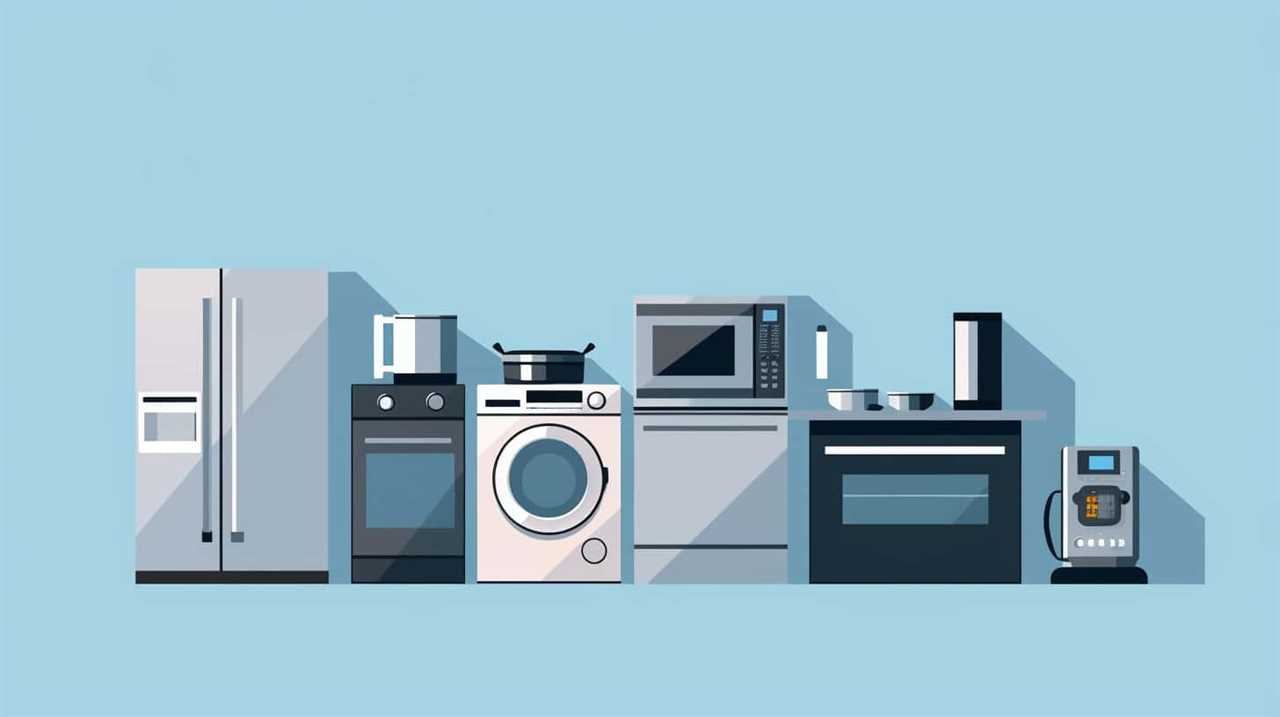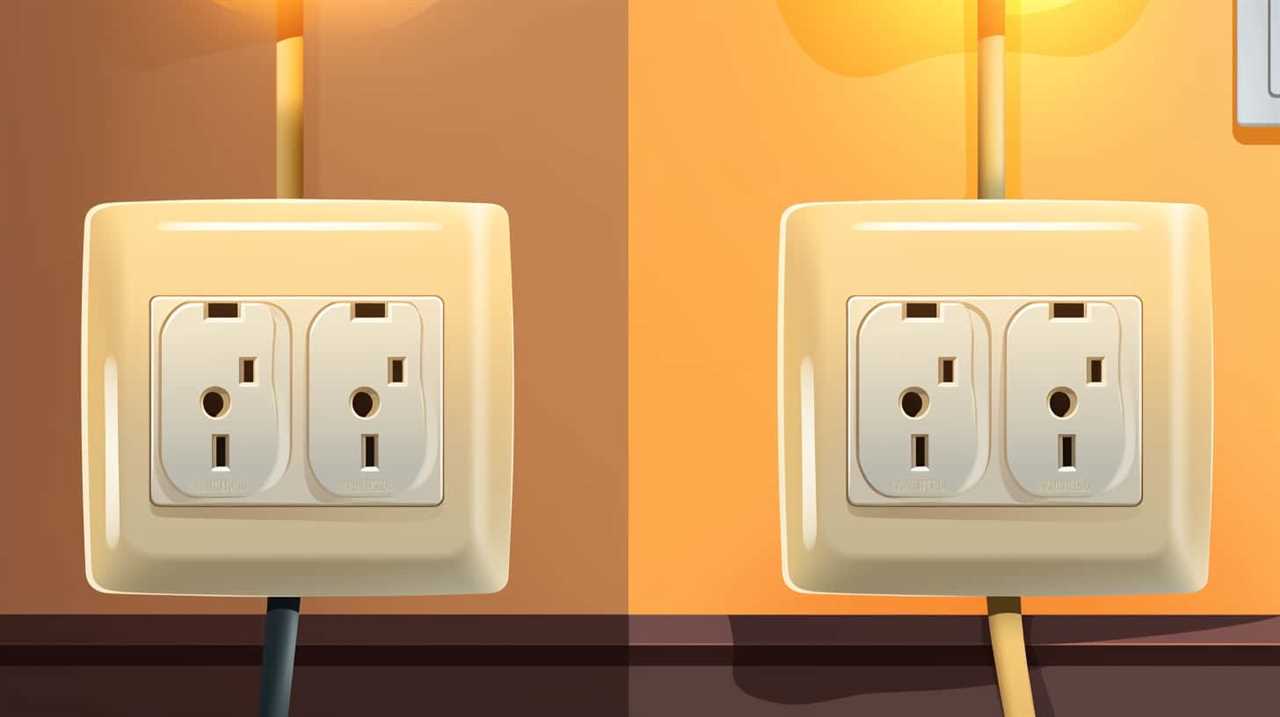At our company, we recognize the significance of adhering to commercial appliance safety regulations. It is essential to have a thorough understanding of these key safety regulations in order to prioritize the well-being of both our employees and customers.
That’s why we have compiled these five essential tips to help you navigate the world of commercial appliance safety regulations with ease. From implementing best practices for safety measures to ensuring compliance with appliance safety standards, we’ve got you covered.
Additionally, training and educating your staff on safety regulations is vital for maintaining a safe working environment. So, let’s dive in and learn how to prioritize safety in your commercial appliance operations.
Key Takeaways
- Regular maintenance and inspections are crucial for ensuring commercial appliance safety.
- Proper installation and adequate ventilation are important factors to consider in maintaining a safe working environment.
- Training and education of employees on appliance safety protocols is essential.
- Compliance with industry standards and regulations is necessary to prevent accidents, injuries, and legal repercussions.
Importance of Commercial Appliance Safety Regulations
The importance of commercial appliance safety regulations lies in their ability to safeguard against potential hazards and ensure the well-being of both employees and customers. Regular equipment maintenance offers numerous benefits that contribute to a safe working environment. By adhering to safety regulations, businesses can prevent accidents and injuries, ultimately saving lives and reducing liability costs.

One of the key benefits of regular equipment maintenance is the early detection of potential issues. By conducting routine inspections and servicing, businesses can identify and address any malfunctions or wear and tear before they develop into major problems. This proactive approach not only prevents costly breakdowns but also minimizes the risk of accidents caused by faulty equipment.
Non-compliance with safety regulations can have severe consequences. Apart from the potential for injuries and fatalities, businesses may face legal repercussions, such as fines and lawsuits. Moreover, a lack of safety measures can harm a company’s reputation and lead to loss of customers and revenue.
Understanding the Key Safety Regulations
First, we’ll discuss five key safety regulations that businesses need to understand for commercial appliance safety. These key safety guidelines are crucial to ensure the safe and efficient operation of commercial appliances in various industries.
- Regular Maintenance: Regular maintenance is essential to keep commercial appliances in good working condition. This includes inspecting and cleaning appliances, replacing worn-out parts, and addressing any issues promptly.
- Proper Installation: Commercial appliances should be installed by qualified professionals following manufacturer guidelines. Improper installation can lead to safety hazards and equipment malfunction.
- Adequate Ventilation: Adequate ventilation is necessary to prevent the buildup of harmful gases, such as carbon monoxide, and to maintain proper airflow around appliances. This can prevent overheating and reduce the risk of fire.
- Electrical Safety: Businesses must comply with electrical safety regulations, such as proper grounding, appropriate wiring, and the use of circuit breakers. Regular inspections and maintenance of electrical systems are vital to prevent electrical shocks and fires.
- Training and Education: Businesses should provide comprehensive training and education on the safe operation and maintenance of commercial appliances to employees. This can help prevent common safety violations and ensure that all employees are aware of safety procedures.
Understanding these key safety regulations is crucial for businesses to avoid common safety violations and ensure the safety of their employees and customers. By following these guidelines, businesses can maintain a safe working environment and prevent accidents and injuries.

Best Practices for Implementing Safety Measures
To effectively implement safety measures, we should prioritize regular inspections and staff training on the proper use and maintenance of commercial appliances. These practices are crucial for ensuring the safety of both employees and customers.
Here are some best practices for implementing safety measures:
- Implementing safety protocols: Create a comprehensive set of safety protocols that address all potential hazards associated with commercial appliances. These protocols should include guidelines for proper installation, operation, and maintenance of the appliances. Regularly review and update these protocols to stay up-to-date with industry standards and regulations.
- Conducting regular inspections: Regularly inspect all commercial appliances to identify any potential safety issues. Inspections should cover electrical connections, gas lines, ventilation systems, and any other components that could pose a risk. Promptly address any identified issues to prevent accidents or injuries.
- Providing staff training: Ensure that all employees receive comprehensive training on the proper use and maintenance of commercial appliances. This training should cover safety protocols, emergency procedures, and best practices for safe operation. Regularly refresh this training to reinforce safety awareness and ensure that staff members are up to date with the latest safety measures.
Ensuring Compliance With Appliance Safety Standards
Implementing safety measures includes ensuring compliance with appliance safety standards by regularly monitoring and updating protocols. This is crucial to prevent safety hazards and maintain a safe working environment. Conducting appliance safety audits is an effective way to assess compliance and identify potential risks or non-compliance issues. These audits should be performed regularly, and the results should be documented and addressed promptly.
To emphasize the importance of compliance, let’s consider a 3×3 table:

| Compliance | Importance | Action |
|---|---|---|
| Regular monitoring | Ensures ongoing compliance | Conduct appliance safety audits regularly |
| Documentation | Provides evidence of compliance | Keep records of audits and corrective actions |
| Prompt action | Prevents safety hazards | Address non-compliance issues promptly |
Compliance with appliance safety standards not only protects employees and customers but also prevents costly accidents and legal liabilities. It is essential to stay up-to-date with any changes or updates to safety standards and regulations. Regular training and communication with employees about appliance safety protocols are also crucial for ensuring compliance.
Training and Educating Staff on Safety Regulations
To ensure compliance with appliance safety standards, we prioritize training and educating our staff on safety regulations. Staff training and safety education are crucial elements in creating a safe and secure working environment. Here are some essential tips for effectively training and educating your staff on safety regulations:
- Develop comprehensive training programs: Create training programs that cover all aspects of safety regulations, including proper handling and operation of commercial appliances, emergency procedures, and preventive maintenance. These programs should be tailored to the specific needs of your establishment.
- Provide regular updates and refresher courses: Safety regulations are constantly evolving, and it’s essential to keep your staff up-to-date with the latest standards. Regular updates and refresher courses will ensure that your employees remain knowledgeable and compliant with the regulations.
- Encourage active participation and feedback: Engage your staff in the training process by encouraging their active participation. Provide opportunities for them to ask questions, share experiences, and provide feedback. This won’t only enhance their understanding but also foster a culture of safety within the organization.
Frequently Asked Questions
What Are the Consequences of Non-Compliance With Commercial Appliance Safety Regulations?
Non-compliance with commercial appliance safety regulations can have serious legal and financial implications.
Legal consequences may include fines, penalties, or even legal action by injured parties.

Financial implications can include costly repairs or replacements of non-compliant appliances, as well as potential loss of business due to damaged reputation.
It’s crucial for businesses to prioritize compliance with these regulations to ensure the safety of employees and customers, as well as to avoid these negative consequences.
Are There Any Specific Regulations Regarding the Use of Electrical Appliances in Commercial Kitchens?
When it comes to electrical appliance requirements in commercial kitchens, there are indeed specific regulations in place. These regulations aim to ensure commercial kitchen safety standards are met, protecting both employees and customers.
Adhering to these regulations is crucial to avoid potential hazards and maintain a safe working environment. It’s important for businesses to stay informed about these regulations and take the necessary steps to comply with them, minimizing the risk of accidents and ensuring the smooth operation of the kitchen.

How Often Should Commercial Appliances Be Inspected to Ensure Compliance With Safety Regulations?
To ensure compliance with safety regulations, it’s important to regularly inspect commercial appliances.
The frequency of inspections will depend on the specific regulations and guidelines set by industry standards or local authorities.
By conducting routine inspections, we can identify any potential hazards or issues that may compromise the safety of the appliances.
Compliance with safety regulations is crucial to protect both employees and customers, and to maintain a safe working environment in commercial kitchens.

Are There Any Resources Available to Assist Businesses in Understanding and Implementing Safety Measures?
Yes, there are resources available to assist businesses in understanding and implementing safety measures.
These resources provide valuable guidance and support for businesses to ensure compliance with safety regulations. They offer step-by-step instructions, checklists, and best practices to help businesses effectively implement safety measures.
What Steps Can Businesses Take to Create a Culture of Safety and Compliance Among Their Staff?
Creating a safety culture is vital for businesses to promote compliance among their staff. It starts with emphasizing the importance of training and providing resources to ensure everyone understands and follows safety protocols.
Regular communication and reminders about safety procedures are also crucial. Encouraging employees to report any potential hazards or concerns fosters a proactive approach to safety.

Conclusion
In the world of commercial appliances, safety regulations are the foundation that keeps businesses operating smoothly. Just as a sturdy anchor holds a ship steady amidst rough waters, these regulations provide stability and security for both workers and customers.
By understanding and implementing the key safety measures, ensuring compliance with standards, and educating staff, businesses can create a safe environment where success can flourish.
So let’s embrace these regulations as a guiding light, leading us towards a brighter and safer future.









